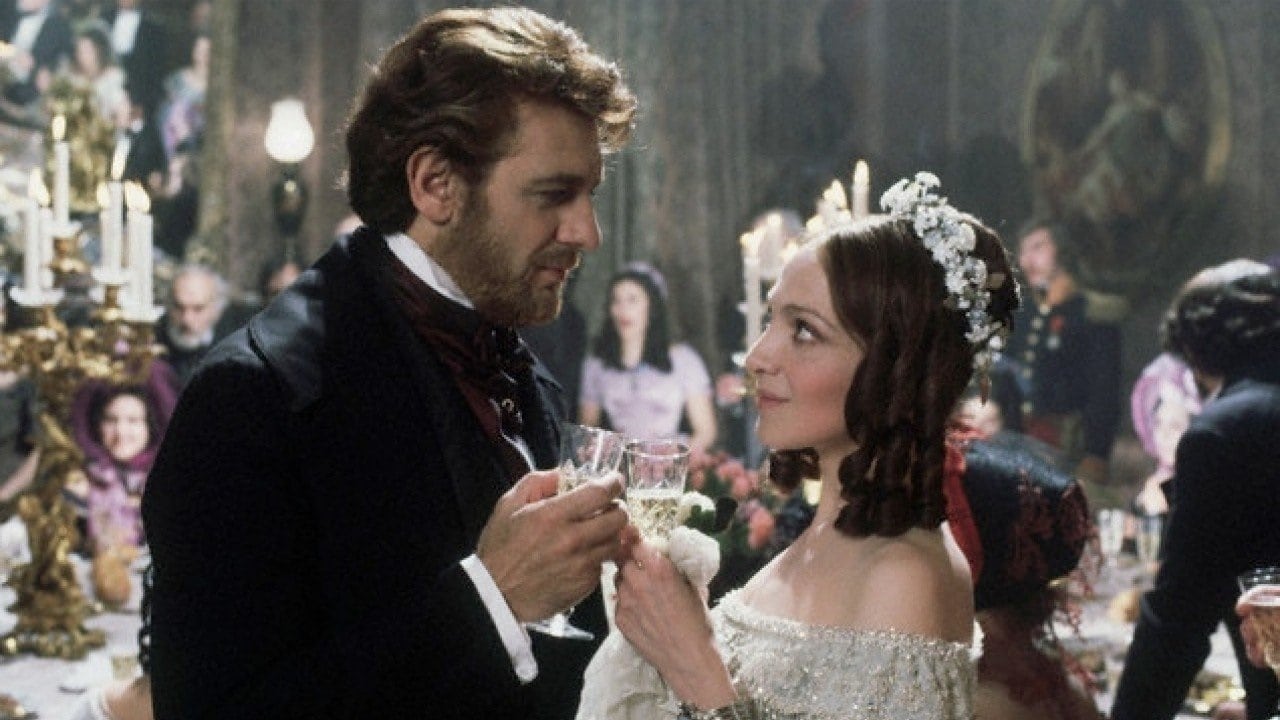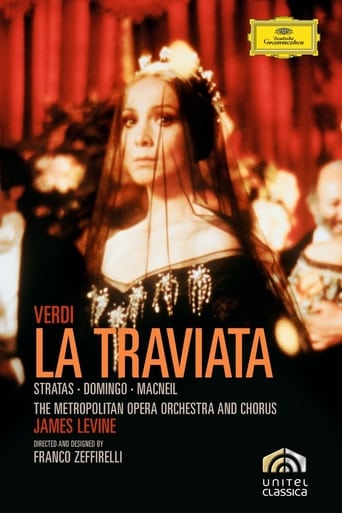

What makes it different from others?
... View MoreSorry, this movie sucks
... View MorePlot so thin, it passes unnoticed.
... View MoreOne of those movie experiences that is so good it makes you realize you've been grading everything else on a curve.
... View MoreDirector Franco Zefferelli, Stars Placido Domingo, Teresa Stratas, Cornell McNeil, Conductor James Levine and the Metropolitan Opera Orchestra, 1982 The forces behind this masterpiece are responsible for its greatness- Italian director and designer Franco Zefferelli, tenor Placido Domingo, soprano Teresa Stratas and baritone Cornell McNeil. The singers are at the top of their game, Domingo is a young, sexy Alfredo and Teresa Stratas IS Violetta Valery in a performance that even Maria Callas would envy. Zefferelli, who has long claimed he had a friendship with her and in truth he had been behind various opera productions of hers, had Maria Callas in mind when he cast Teresa Stratas. Like Callas, Stratas has a Greek background through her parents though she was Canadian born, has similar looks, has the same type of dramatic voice and she is in Zefferelli's own words "an electrifying actress and soprano of the lyric entertainment". The Callas connection is most obvious when Stratas appears in a black veiled gown in Act 2 at Flora's party where even her hair is similar to Callas' infamous 50's performances.Released in 1982, Zefferelli sought to "convert" people into opera lovers through the lush visual seduction of the cinema. This is exactly what he did. The cinematography of this film kills you with excessive beauty. The opening credits roll as we see scenes of Paris in the Notre Dame Cathedral area and surrounding residential district by the Seine river. The interior of Violetta Valery's mansion, where she hosts the Act 1 party, is luxurious and Zefferelli allows us to be dizzied with the sheer opulence of the house- gilded mirrors, portraits of Violetta, curtains, chandeliers etc. Visually on film we are able to tell things about the characters that stage performances do not, for example as the guests depart from Act 1's party, an old woman steals a silver box from Violetta proving to us that Violetta is not among real friends, these are only fair-weathered friends and bad ones at that. They were not even there for her when she was dying in the finale. Also noteworthy is the cruel trick one has to catch on early on. Violetta and Alfredo are never reunited, as in the opera, but instead his return is a hallucination and she dies alone in her apartment.The beginning of the film has Violetta reminiscing about the better days as a desirable and wealthy courtesan who partied all the time. She is deathly ill and already her house is sold and men are moving her things out. The country scenes are incredibly beautiful as Violetta and Alfredo live happily in seclusion. Alfredo rides his horse and Violetta picks flowers for her greenhouse and feeds her white doves in their big cage. Cornell McNeil's bombastic but fatherly Giorgio Germont is a great support to the refined performances of Domingo and Stratas. The Flora's party scene is exceptional with even more visual beauty as Gypsies and bullfighters dance seductively and professional gamblers enjoy themselves. The closing ensemble is not to be missed and neither is the melancholy and tragic ending. This is the greatest and ultimate version of La Traviata ever made. It is a must have for opera fans and for curious non-opera lovers.
... View MoreWhat glorious music! What Glorious singing! A story bigger than life. Production values that do justice to Verdi's opera. This is grand opera at its grandest. In a scale from 1 to 19, this is a 20.Generally in opera, the singing is the thing. One puts up with elephantine singers, make believe props, bad acting, and other shortcomings to enjoy the music, and especially, the singing. In this film, none of this annoyances takes place. Teresa Stratas looks beautiful as Violeta should. She sings gloriously as Teresa should. Ditto with Placido Domingo. Unlike some opera singers, both of them can act. The sets are sumptuous, the lighting excellent, the cinematography nonpareil. The direction and editing propel the story without flagging for any moment. This film is as close to perfection as humans can achieve.
... View MoreA filmed version of Guiseppe Verdi's opera. It's about a love affair between beautiful Violetta Valery (Teresa Stratas) and Alfredo Germont (Placido Domingo). Their love for each other is torn apart by his father--but she still loves him. It all leads to a tragic end.I saw this in a theatre back in 1982. They tried to play it like an opera. When I walked in the screen was covered by a red curtain (back in those days some of the older theaters still had curtains). As the lights went down the curtain parted and the film began. When the film ended, the curtains pulled back together and the lights came up. My audience applauded even after the lights were up. It gave the feeling of being at a live opera. That can't be recreated at your home but this film is still well worth seeing.Director Franco Zeffirelli wisely did not film the opera as it is staged. He opened it up--this was set up for a film. Sequences take place outside and the inside sets are way too elaborate for an actual opera.The costumes are beautiful and the sets are just stunning--full of color and light. Every moment of this picture is filled with beautiful imagery. It matches perfectly with the singing and the music which are just incredible. There's even a show-stopping matador dance half-way through! I've never seen the opera but I've heard this is very faithful and Stratas and Domingo have beautiful voices and also can act! The only negative here is that Domingo is way too old for his role...but that can be forgiven whenever he sings.This was actually a sizable hit back in 1982. The same team got together a few years later and filmed "Othello". Surprisingly that was TERRIBLE and is a textbook example of how NOT to do an opera! But this one is just great and a must-see. I give it a 10.
... View MoreWho else but Franco Zeffirelli could make what is the best opera movie ever? He has made several of them. After all, his productions at La Scala in the '50s catapulted that opera house once again to reign among the world's best, and preceded his move into film making. Known for lush period costume dramas, Zeffirelli surely doesn't disappoint in that department. In fact, visually, LA TRAVIATA ranks among his best work. Controversial innovations, luxurious locations, and superb casting make LA TRAVIATA even more unique. His editing down of several (repetitive) arias, and visual depiction of many of the arias' contents through flashbacks caused much controversy in Europe where I first saw it in its 1982 premiere. However, the controversy was generated by opera purists, since from a purely artistic viewpoint, not to mention a strictly cinematic one, LA TRAVIATA has never been so well expressed, in fact no opera has. The cinematic enhancements and cutting a few minutes off the running time to make the work more accessible only made opera more attractive to all. The beautiful actual locations of the Seine, old Paris, the French countryside, and opulent palaces are a treat to watch as the wonderful music, conducted by the Met's legendary James Levine is played. Neither is pushed back to the background. Both elements blend into an unforgettable whole. If one wants to see pure opera, one can buy several versions of LA TRAVIATA especially filmed live at an opera house, and watch the musicians in the orchestra pit play, the conductor's gestures, and hear the superb voices of the usually out of character (physically and age-wise) singers on stage. The performances are usually longer as many arias are repeated several times, something film can avoid through its unique advantages. In this case the performance on film runs 1 hour 45 minutes, without the elimination of any arias (just avoiding the repetition described above). In contrast, the opera house experience, including two intermissions usually runs twice that length, if not longer. This version of LA TRAVIATA is not only fine movie-making, but showcases the superb voices and musical excellence of the best of the classical recordings. With the sublime Teresa Stratas in the title role, and the now legendary Placido Domingo as her love interest, one cannot ask for better leads. They are also of believable age, and display great chemistry together. The young Domingo's fiery Latin emotions with his imposing looks, and the very slender and also young Stratas' passionate interpretation (especially in her facial gestures) are totally convincing and captivating, as are, needless to say, their vocal talents, among the greatest of the century. Added touches such as subtle shots focusing on the period's social customs, and a knock-out ballet sequence in a party scene are among the final master touches to this unique production. One simply cannot compare, say, the "classical" version released two years later featuring Dame Joan Sutherland (possibly the greatest soprano ever, but at the end of her incredible career)and Luciano Pavorotti (to whom comparable comments also apply). But two extremely overweight leads pushing sixty portraying young lovers obviously lend a different perspective of this great opera. Placido Domingo and Zeffirelli have since made more opera movies, and they are all excellent. But here, Domingo is in his prime, and looks the part. (He has obviously aged as consequent opera films were made, up to ten years later in fact.) And Zeffirelli here is still at the stage designing grand opera productions around the world, while still in his creative prime as a film maker. As for Stratas, her Violeta (la traviata, the woman led stray) is, for me, the highlight of many highlights. She combines compelling acting, unforgettable vocal agility, and (almost unheard of in opera) a very thin, attractive physique. It is almost to good to be true. Many viewers who are not opera buffs do in fact think she is a dramatic actress dubbed by a great soprano. An incredible package indeed, and this applies to the entire production. Definitely a 10. Someone should put pressure on Universal (who is still selling the same 16 year old video) to restore this gem, and re-release it on video and DVD. I just bought another VHS, and was disappointed it was still the original version. With DVD's growth, I'm sure that will soon change if it isn't already happening. Don't miss it in any version you can get your hands on.
... View More